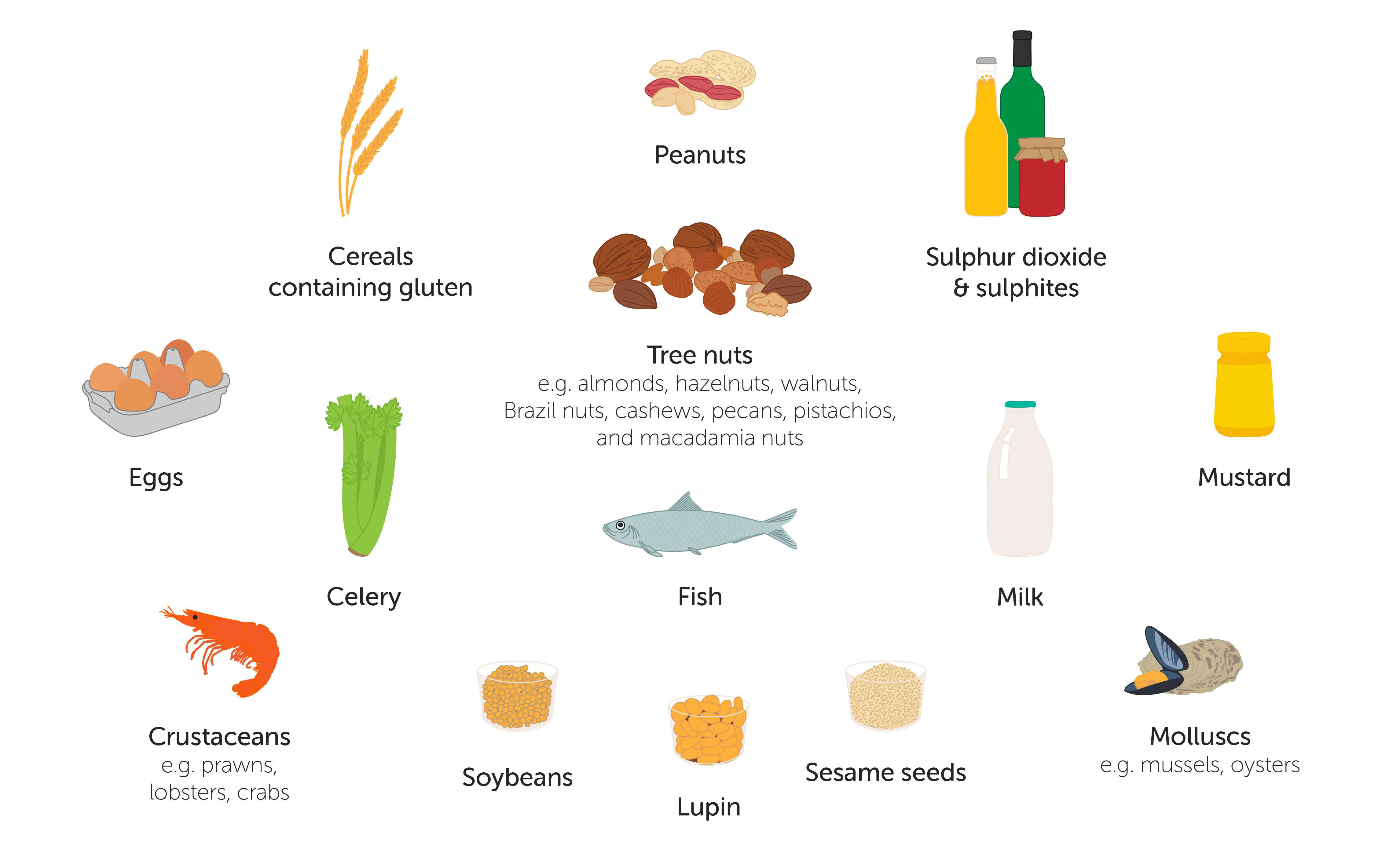Natasha’s Law for October 2021: what small businesses should know
3-minute read

Natasha’s Law – new allergen legislation that requires food packed on the same site from which it’s sold to be labelled with full ingredients – will be in force from October 2021.
The law was introduced in 2019 following the tragic death of teenager Natasha Ednan-Laperouse, who suffered a fatal allergic reaction after eating a baguette bought from Pret a Manger.
As the law didn’t require sandwiches prepared on site to be labelled with allergen information, Natasha was unaware that the baguette contained sesame.
The government says that full ingredient labelling received “overwhelming” support from the public – here’s how food businesses can prepare for the change.
This article was updated on 8 September 2021
Natasha’s Law: what’s the current legislation?
At the moment, pre-packed food and drink prepared off site needs to be clearly labelled with an ingredients list and allergen information emphasised.
But if you’re making pre-packed food on site for direct sale (for example, sandwiches or salads you make and pack on site to sell on the same day), you just need to make sure that allergen information is given verbally or in writing.
This doesn’t need to be a label with a full ingredients list – it can be on a menu, chalkboard or information pack, according to the Food Standards Agency (FSA).
It can also be a written notice that details how customers can find the information, like a sign that tells customers they should speak to staff.
Read more: Allergen information – food labelling regulations for small businesses
What changes after Natasha’s Law comes into force?
Following Natasha Ednan-Laperouse’s death, her parents campaigned for a change to the law to better protect allergy sufferers.
The government consulted on various options, including ‘ask the staff’ labelling on products, but “received overwhelming support from consumers for full ingredients labelling, with more than 70 per cent of individuals backing this option.”
This means that:
- businesses will need to label products prepared and packaged on site with a full ingredients list and allergen information
- packaged sandwiches, salads, and other items made by staff earlier in the day and placed on a shelf for purchase should be labelled
- food that’s not in packaging, or is packed after being ordered by the customer, doesn’t need to be labelled (allergen information needs to be given, but you can do this orally)
The new law will come into force on 1 October 2021.
Heather Hancock, Chair of the Food Standards Agency, said: "Whilst it’s impossible to eliminate the risks entirely, we believe this change will mean better protection for allergic consumers."
The rules will apply to England, Scotland, Wales, and Northern Ireland.
For more information, visit:

Examples of foods covered by Natasha’s Law
The FSA has a list of example foods (as well as detailed technical guidance about the law) that count as pre-packed for direct sale, to help you understand whether you need to label the products you sell:
- sandwiches and bakery products packed on site before a consumer chooses or orders them
- fast food packed before it’s ordered (like a burger under a hot lamp where the food can’t be altered without opening the packaging)
- products pre-packaged on site ready for sale (like pizzas, rotisserie chicken, salads and pasta pots)
- burgers and sausages pre-packaged by a butcher on the premises ready to sell to customers
- samples of cookies given to customers for free which were packed on site
- foods packaged and then sold elsewhere by the same operator at a market stall or mobile site
- pre-packed food for sale given in schools, care homes, or hospitals and other similar settings will also need labelling
Natasha’s Law October 2021: preparing for new allergen legislation
If you’re a food and drink business, it’s likely that you’re still trying to recover following lockdown.
Even so, it’s important to prepare for the upcoming change. Customers who suffer allergies and have bought food from you without problems should have the confidence to come back.
Here’s what you can do:
1. Natasha’s Law training for you and your staff
Tragic cases like Natasha’s shows that the consequences of mislabelling food products are severe.
You and your staff should already know about allergens and how to communicate them to customers. If you have staff and you aren’t doing so already, training employees on the new allergen legislation should minimise the risk of errors and mistakes when it comes to labelling.
Appropriate labelling means listing ingredients with allergen information emphasised (often in bold font) – there are 14 major allergens that you should be aware of.
2. Link up your food data with labelling
Linking up a database of food products and ingredients to the way you print labels will help make sure that the correct information is transferred easily.
This database could record your products, recipes and ingredients, making it easy to track what’s being used and where.
Apps and technology can help you do this. For instance, a cloud-based tool called Andromeda aims to help takeaway and delivery businesses label their products with allergen information already available on their websites.
Another app called Ubamarket lets customers scan a product’s barcode, which instantly tells them whether it contains allergens.
While implementing technology might lead to more costs in the short-term, it could ultimately help you become more efficient. It’s worth investigating what technology is out there that will suit your business.
3. Follow all the guidance – and encourage loyalty
The best place to check for up-to-date information on allergen legislation is the FSA.
You can also speak to your local authority, as well as a legal professional if you want to get advice specific to your business.
It’s important to keep in mind that there are two million allergy sufferers across the country – and many find it difficult to buy food in shops and restaurants with confidence.
If you make the changes successfully, you’ll establish your reputation as a business that listens to the needs of allergy sufferers. This should encourage trust and loyalty.
What about Natasha’s Law and public liability insurance?
Keep in mind that public liability insurance can cover you if someone suffers an allergic reaction after consuming your products.
It won’t cover you if you’ve been negligent and haven’t followed food hygiene or labelling regulations. But if you’ve followed all the rules and a customer has a reaction to something that didn’t need to be disclosed, public liability insurance can cover the resulting claim and compensation costs.
More small business guides
What do you think about Natasha’s Law? Let us know in the comments below.
Looking for self-employed insurance?
With Simply Business you can build a single self employed insurance policy combining the covers that are relevant to you. Whether it's public liability insurance, professional indemnity or whatever else you need, we'll run you a quick quote online, and let you decide if we're a good fit.
Start your quote
Written by
Sam Bromley
Sam has more than 10 years of experience in writing for financial services. He specialises in illuminating complicated topics, from IR35 to ISAs, and identifying emerging trends that audiences want to know about. Sam spent five years at Simply Business, where he was Senior Copywriter.
We create this content for general information purposes and it should not be taken as advice. Always take professional advice. Read our full disclaimer
Keep up to date with Simply Business. Subscribe to our monthly newsletter and follow us on social media.
Subscribe to our newsletterInsurance
Public liability insuranceBusiness insuranceProfessional indemnity insuranceEmployers’ liability insuranceLandlord insuranceTradesman insuranceSelf-employed insuranceRestaurant insuranceVan insuranceInsurersAbout
About usOur teamAwardsPress releasesPartners & affiliatesOur charitable workModern Slavery ActSection 172 statementSocial mediaSite mapAddress
6th Floor99 Gresham StreetLondonEC2V 7NG
Northampton 900900 Pavilion DriveNorthamptonNN4 7RG
© Copyright 2024 Simply Business. All Rights Reserved. Simply Business is a trading name of Xbridge Limited which is authorised and regulated by the Financial Conduct Authority (Financial Services Registration No: 313348). Xbridge Limited (No: 3967717) has its registered office at 6th Floor, 99 Gresham Street, London, EC2V 7NG.